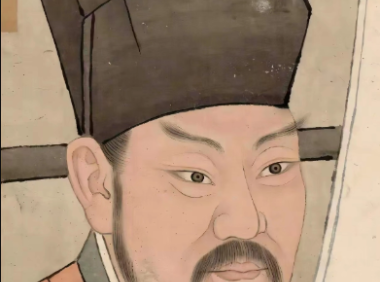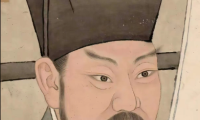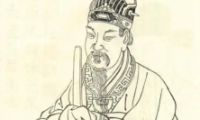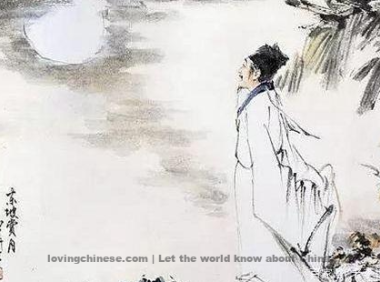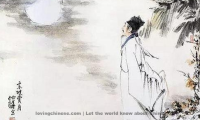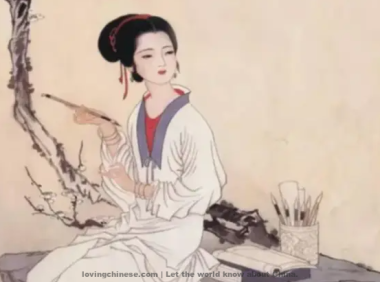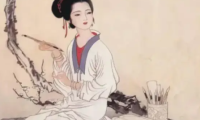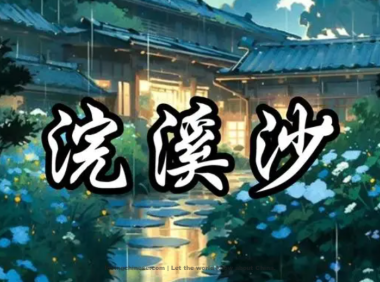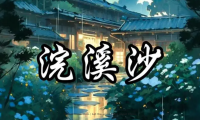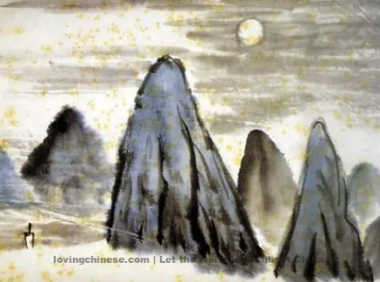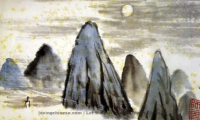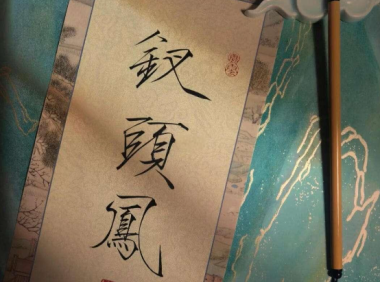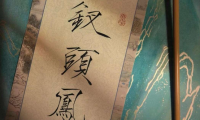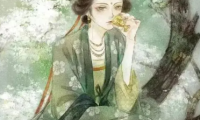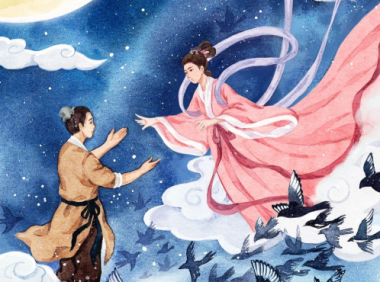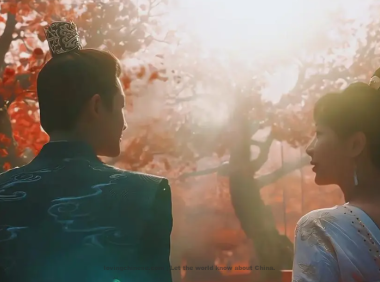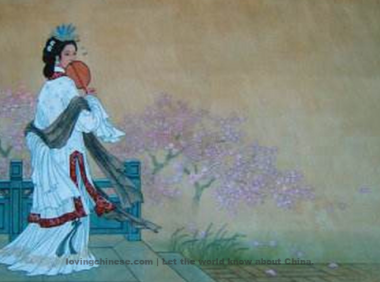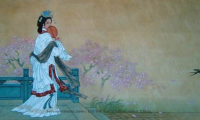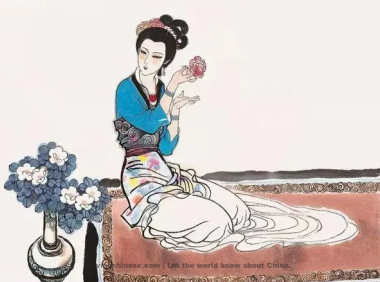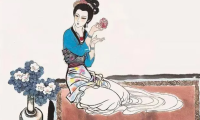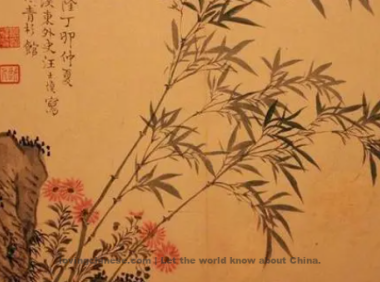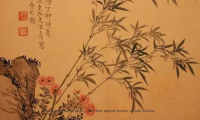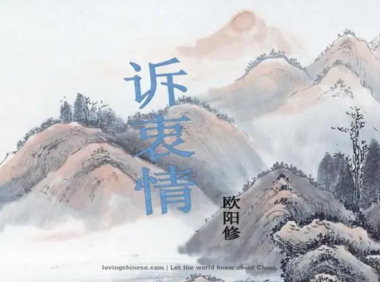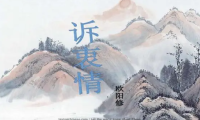-
Folk Song of the Lower Yangtze Valley (Southern Song Dynasty) ~ 无名氏·《吴歌》 with English Translations
This song is a folk song that has been popular in the Wu region of Jiangnan since the Southern Song Dynasty. From the Jianyan period of the Southern Song Dynasty (1127-1130), it describes the suffering of civil unrest. This song, in the form of questioning, reveals that the ruling class of the Southern Song Dynasty implemented non resistance against foreign invasion, brutally oppressed the people internally, and lived a luxurious and debauched life in Jiangnan, causing the common people to suffer from chaos. 这首歌是南宋以来流行于江南吴地一带的民歌。出自南宋建炎年间(1127—1130年),述民间离乱之苦。这首歌以问话的形式,揭露南宋统治阶级在外族入侵时,对外实行不抵抗主义,对内残酷压迫人民,偏安江南,过着骄奢淫逸的生活,使老百姓饱受离乱之苦。 无名氏·《吴歌》 月子弯弯照几州?几家欢乐几家愁? 几家夫妇同罗帐?几家飘散在他州? Folk Song of the Lower Yangtze Valley (Southern Song Dynasty) Anonymous The crescent moon shines pale On how many countries? How many families are happy, How many families are sad? How many men and women Are happily reunited, And how many, how many, Stay lost in strange, strange lands?...
- 0
- 0
- 47
-
Wang Anshi: On Zhuge Liang ~ 王安石·《论诸葛武侯》 with English Translations
Wang Anshi (December 18, 1021- May 21, 1086), also known as Jiefu and Banshan, was a Han Chinese from Linchuan (now Linchuan District, Fuzhou City, Jiangxi Province). He was a famous philosopher, politician, writer, and reformer of the Northern Song Dynasty. In the second year of Qingli (1042), Wang Anshi became a Jinshi and successively held the posts of Yangzhou signing judge, Yinxian Supervisor of the County, Shuzhou general judge, etc., with remarkable achievements. In the second year of Xining (1069), he was appointed as a political counselor, and the following year he became a prime minister and presided over the reform. Due to opposition from the conservative faction, he was dismissed as prime minister in the seventh year of the Xining reign (1074). One year later, Emperor Shenzong of Song rose to power again, but then resigned and retreated to Jiangning. In the first year of Yuanyou (1086), the conservative faction gained power and all new laws were abolished. He died of illness in Zhongshan (now Nanjing, Jiangsu) and was posthumously named "Wen". He was later known as Wang Wengong. 王安石(1021年12月18日-1086年5月21日),字介甫,号半山,汉族,临川(今江西抚州市临川区)人,北宋著名的思想家、政治家、文学家、改革家。 庆历二年(1042年),王安石进士及第,历任扬州签判、鄞县知县、舒州通判等职,政绩显著。熙宁二年(1069年),任参知政事,次年拜相,主持变法。因守旧派反对,熙宁七年(1074年)罢相。一年后,宋神宗再次起用,旋又罢相,退居江宁。元祐元年(1086年),保守派得势,新法皆废,郁然病逝于钟山(今江苏南京),谥号“文”,故世称王文公。 王安石·《论诸葛武侯》 恸哭杨顒为一言,余风今日更谁传。 区区庸蜀支吴魏,不是虚心岂得贤。 On Zhuge Liang Wang Anshi You lamented Yang Yu’s death just for his one…...
- 0
- 0
- 58
-
Yang Wan-li: feeling sad for the farmers ~ 杨万里·《悯农》 with English Translations
Compassion for Farmers "is a seven character quatrain created by Yang Wanli in the Song Dynasty. The first two sentences of this poem describe the disaster this year: due to the lack of rain for a long time, the rice fields are short of water, and most of the seedlings have died; The last two sentences reveal the anxious inner activities of farmers: they had expected to suffer from hunger and starvation this winter, but unexpectedly encountered a leap year, making life even more difficult. The language of this poem is simple and natural, with layers of rendering and deepening step by step, depicting the disaster of farmers in a very specific and profound way, revealing the poet's sincere sympathy for the working people between the lines. 《悯农》是宋代杨万里创作的一首七言绝句。此诗前两句叙述今年的灾情:由于久早无雨,稻田缺水,秧苗大半枯死;后两句揭示农民忧心如焚的内心活动:本来早已料到今冬要受饥挨饿,谁知偏偏又遇上闰年,日子更难过。此诗语言朴实自然,层层渲染,步步加深,将农民的灾难描写得十分具体、深刻,字里行间流露出诗人同情劳动人民的一片赤诚之心。 杨万里·《悯农》 稻云不雨不多黄,荞麦空花早著霜。 已分忍饥度残岁,不堪岁里闰添长。 feeling sad for the farmers --yang wanli the rice field looks like a rack of clouds but there wasn’t enough rain really the field has turned yellow in the drought and the yellowed ears have not matured an early frost nipped the buckwheat so the farmers will have to suffer but there are thirteen lunar months this year and they will suffer longer and how can they...
- 0
- 0
- 53
-
Su Shih: A Toad ~ 苏轼·《虾蟆》 with English Translations
Su Shi (January 8, 1037- August 24, 1101), also known as Zizhan, Hezhong, and "Dongpo Jushi", was commonly referred to as "Su Dongpo". Han ethnicity, from Meizhou. A poet and poet of the Northern Song Dynasty, a literary figure of the Song Dynasty, he was one of the main representatives of the bold and unrestrained poets and one of the "Eight Masters of the Tang and Song Dynasties". Politically, it belongs to the old party, but there are also demands for reform and corrupt governance. His writing is unrestrained and clear, with a wide range of themes and rich content. There are over 3900 existing poems. 苏轼(1037年1月8日-1101年8月24日),字子瞻,和仲,号“东坡居士”,世称“苏东坡”。汉族,眉州人。北宋诗人、词人,宋代文学家,是豪放派词人的主要代表之一,“唐宋八大家”之一。在政治上属于旧党,但也有改革弊政的要求。其文汪洋恣肆,明白畅达,其诗题材广泛,内容丰富,现存诗3900余首。 苏轼·《虾蟆》 睅目知谁瞠,皤腹空自胀。 慎勿困蜈蚣,饥蛇不汝放。 A Toad Su Shih Bulging eyes: who you glaring at? Who you bluffing, puffing that white belly out. You’d better not bother a centipede… How much less a hungry snake? He’d never leave you be. (J. P. Seaton 译)...
- 0
- 0
- 58
-
Collected Better-known Sayings ~ 《名贤集》 with English Translations
The Collection of Famous Scholars "is a popular popular reading material among the people since the Southern Song Dynasty. It collects some maxims, poems, proverbs, etc. Some of the content belongs to feudal preaching, while others are infused with the ideas of karma and retribution from both Buddhism and Taoism. The "Collection of Famous Scholars" tells the basic principles of dealing with people through the famous sayings and good deeds of famous scholars throughout history. The "Collection of Famous Scholars" is composed of four, five, six, and seven characters, which are easy to recite and remember, and can be read fluently. 《名贤集》为南宋以来流行在民间的一种通俗读物。里面收集了一些格言、诗句、谚语等。其中有些内容属封建说教,有些还渗透了佛、道两教的因果报应等思想。《名贤集》以历代名人贤士的名言善行,讲述了为人处世的基本道理。《名贤集》以四言、五言、六言、七言组成,易诵易记,读之朗朗上口。 《名贤集》 但行好事,莫问前程。与人方便,自己方便。善与人交,久而敬之。人贫志短,马瘦毛长。人心似铁,官法如炉。谏之双美,毁之两伤。赞叹福生,作念祸生。积善之家,必有余庆。积恶之家,必有余殃。休争闲气,日又平西。 Collected Better-known Sayings What you should do only is good deeds, paying no attention to the future. To help others is to help yourself. If you are good at your contacts with other people, you'll get respected by them some time later. When a man is poor, his ambition is not far-reaching; when a horse is thin, his hair looks long. People's hearts are like iron, and official laws are like a furnace. It's a good thing for two persons to remonstrate with each other, and yet both suffer if they slander one another. Praising others…...
- 0
- 0
- 53
-
Li Qingzhao: Where? Where should it go, the lonely soul?
Li Qingzhao 声声慢·寻寻觅觅 原作:李清照 英译:戈登.奥赛茵,闵晓红 寻寻觅觅, 冷冷清清, 凄凄惨惨戚戚。 乍暖还寒时候, 最难将息。 三杯两盏淡酒, 怎敌他、晚来风急? 雁过也,正伤心, 却是旧时相识。 满地黄花堆积。 憔悴损, 如今有谁堪摘? 守著窗儿, 独自怎生得黑? 梧桐更兼细雨, 到黄昏、点点滴滴。 这次第, 怎一个愁字了得! Where? Where should it go, the lonely soul? - to the Tune Shengshengman written by Li Qingzhao ( 12th century) trans by Gorden Osing & Julia Min Where? Where should it go, the lonely soul? Too dreary in miseries, in day dreaming! Gone is the world's warmth, its cold now holding my very being. Would a few cups of wine soothe the wind that also violates the heart of evening? You flying geese in the rising air were once our loved go-betweens. With whom shall I pick the chrysanthemum shrinking and withering, now all fallen? Am I to spend forever tonight at my window here, alone again, watching at dusk, in the parasol trees, the mists turning inexorably to rain? No word is desolate enough to imitate this joyless scene! Appreciation: Some collections call this ci "Autumn Thoughts." It was apparently composed in August 1129 upon her husband’s sudden death, and her sorrows had become multiple, so far as she could tell, permanent. She was distraught and yet, perhaps, tried very hard to maintain her dignity in…...
- 0
- 0
- 66
-
Li Qingzhao: Writing Poems For Thirty Years: (Linked Poetry Using the Word “Zi”)
Li Qingzhao Writing Poems For Thirty Years: (Linked Poetry Using the Word “Zi”) 分得知字 学 语 三 十 年緘 口 不 求 知。 谁 遣 好 奇 士相 逢 说 项 斯? Fen De Zhi Zi Xue yu san shi nianJian kou bu qiu zhi. Shei qian hao qi shiXiang feng shuo xiang si? Linked Poetry Using the Word “Zi” Writing poems for thirty yearsNot knowing another’s circumstances, keep one’s mouth closed. Who sends for extraordinary and unique intellectualsTo meet each…... -
Wu Wenying Poem: Silk-washing Stream – 吴文英《浣溪沙》
"Silk-washing Stream" is a lyric composed by Wu Wenying of the Southern Song Dynasty....
- 0
- 0
- 8
-
Jiang Kui Poem: Treading on Grass – 姜夔《踏莎行·燕燕轻盈》
This song is written by Jiang Kui, a lyricist of the Song Dynasty....
- 0
- 0
- 7
-
Lu You Poem: Phoenix Hairpin– 陆游《钗头凤·红酥手》
The lyric "Phoenix Hairpin" is a composition by the Song Dynasty writer Lu You....
- 0
- 0
- 0
-
Le Wan Poem: Song of Divination · In Reply to Her Love – 乐婉《卜算子答施》
The poem "Song of Divination · In Reply to Her Love" is a poem written by Le Wan, a famous courtesan of the Southern Song Dynasty....
- 0
- 0
- 8
-
Li Qingzhao Poem: Tipsy in the Flowers’ Shade – 李清照《醉花阴·薄雾浓云愁永昼》
"Tipsy in the Flowers' Shade" is a work by Li Qingzhao, a female lyricist of the Song Dynasty....
- 0
- 0
- 13
-
Li Qingzhao Poem: A Twig of Mume Blossoms – 李清照《一剪梅·红藕香残玉簟秋》
"A Twig of Mume Blossoms" is a lyric by Li Qingzhao, a female lyricist of the Song Dynasty....
- 0
- 0
- 10
-
Qin Guan Poem: Immortals at the Magpie Bridge – 秦观《鹊桥仙·纤云弄巧》
The Magpie Bridge Fairy is a lyric by Qin Guan of the Song Dynasty....
- 0
- 0
- 10
-
Yan Jidao Poem: Everlasting Longing – 晏几道《长相思·长相思》
"Everlasting Longing" is a lyric written by Yan Qidao, a lyricist of the Northern Song Dynasty....
- 0
- 0
- 24
-
Yan Jidao Poem: Riverside Daffodils – 晏几道《临江仙·梦后楼台高锁》
"Riverside Daffodils" is a lyric by Yan Qidao of the Song Dynasty....
- 0
- 0
- 0
-
Wang Anguo Poem: Shortened Form of Magnolia Flower · Spring Love – 王安国《减字木兰花·春情》
The poet Wang Anguo composed this piece of literature in the Song Dynasty....
- 0
- 0
- 12
-
Ouyang Xiu Poem: Butterflies in Love with Flowers – 欧阳修《蝶恋花·庭院深深深几许》
"Butterflies in Love with Flowers" is a lyric by Feng Yansi (or Ouyang Xiu, a writer of Song Dynasty)....
- 0
- 0
- 12
-
Zhang Xian Poem: Telling Innermost Feeling – 张先《诉衷情》
The lyric "Telling Innermost Feeling" is a song by Zhang Xian, a lyricist of the Northern Song Dynasty....
- 0
- 0
- 8
-
Zhang Xian Poem: Song of Flower Shrub – 张先《一丛花令·伤高怀远几时穷》
"Song of Flower Shrub" is a lyric by Zhang Xian of the Northern Song Dynasty....
- 0
- 0
- 3
-
Liu Yong Poem: Bells Ringing in the Rain – 柳永《雨霖铃·寒蝉凄切》
"Bells Ringing in the Rain" is a lyric by the Song Dynasty lyricist Liu Yong....
- 0
- 0
- 10
-
Chen Ya Poem: Mountain Hawthorn – 陈亚《生查子·药名闺情》
"Mountain Hawthorn" is a work by Chen Ya, a lyricist of the Northern Song Dynasty....
- 0
- 0
- 16
-
Lin Bu Poem: The Everlasting Longing – 林逋《长相思·吴山青》
The lyrics of "The Everlasting Longing" are written by Lin Bu, a writer of the Song Dynasty....
- 0
- 0
- 11
-
Wu Wenying Poem: Dreaming of the South – 吴文英《望江南·三月暮》
The lyric "Dreaming of the South" is a lyric written by Wu Wenying, a lyricist of the Southern Song Dynasty....
- 0
- 0
- 9
















